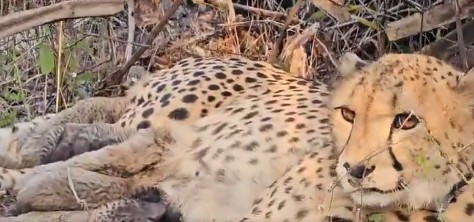In a major achievement for India’s ambitious ‘Cheetah Reintroduction (translocation) Project’, an India-born female cheetah named Mukhi has given birth to five healthy cubs at Kuno National Park, Madhya Pradesh. This is the first successful reproduction by a cheetah born on Indian soil.
Madhya Pradesh Chief Minister Mohan Yadav took to X to share the news, calling it “a historic milestone” and “an unprecedented breakthrough” for wildlife conservation in the country. “Indian-born cheetah Mukhi has given birth to five cubs in Kuno National Park. The mother and cubs are doing well,” he said, sharing a video of Mukhi with her cubs. At just 33 months old, Mukhi has become the first India-born cheetah to reproduce.
Mukhi’s story is one of resilience. Born in March 2023 to Namibian cheetah Jwala as part of the world’s first inter-continental cheetah translocation project, she was the sole survivor of a four-cub litter, after her siblings succumbed to extreme heat. Hand-reared by park officials, Mukhi’s journey from vulnerability to motherhood highlights the dedication of conservation teams working on the project.
The birth of five cubs – an unusually large litter for cheetahs – raises hopes for genetic diversity and the long-term viability of the species in India. Park authorities said Mukhi and her cubs are under round-the-clock monitoring through radio collars and camera traps and are in excellent health.
“This successful reproduction by an India-born cheetah is a strong indicator of the species’ adaptation and health,” Dr Yadav said, adding that the milestone strengthens India’s conservation goals under Prime Minister Narendra Modi’s leadership. Wildlife experts have described the event as a “turning point” for the project, proving that cheetahs can survive, thrive, and breed across generations in Indian habitats.
Launched on September 17, 2022, Project Cheetah marked India’s first attempt to reintroduce the species, declared extinct in India in 1952, through translocation from Africa. Initial batches of eight cheetahs from Namibia and 12 from South Africa were brought to Kuno, reviving the Asiatic cheetah’s lineage in its historical range.
Despite early challenges, including adult mortalities, the project has recorded over two dozen cubs born in India, with survival rates exceeding global averages. With Kuno now home to second-generation cheetahs, authorities plan to expand the species’ habitat to other sites, including Gandhi Sagar Sanctuary, reinforcing India’s role in pioneering bold wildlife restoration efforts.
IANS














